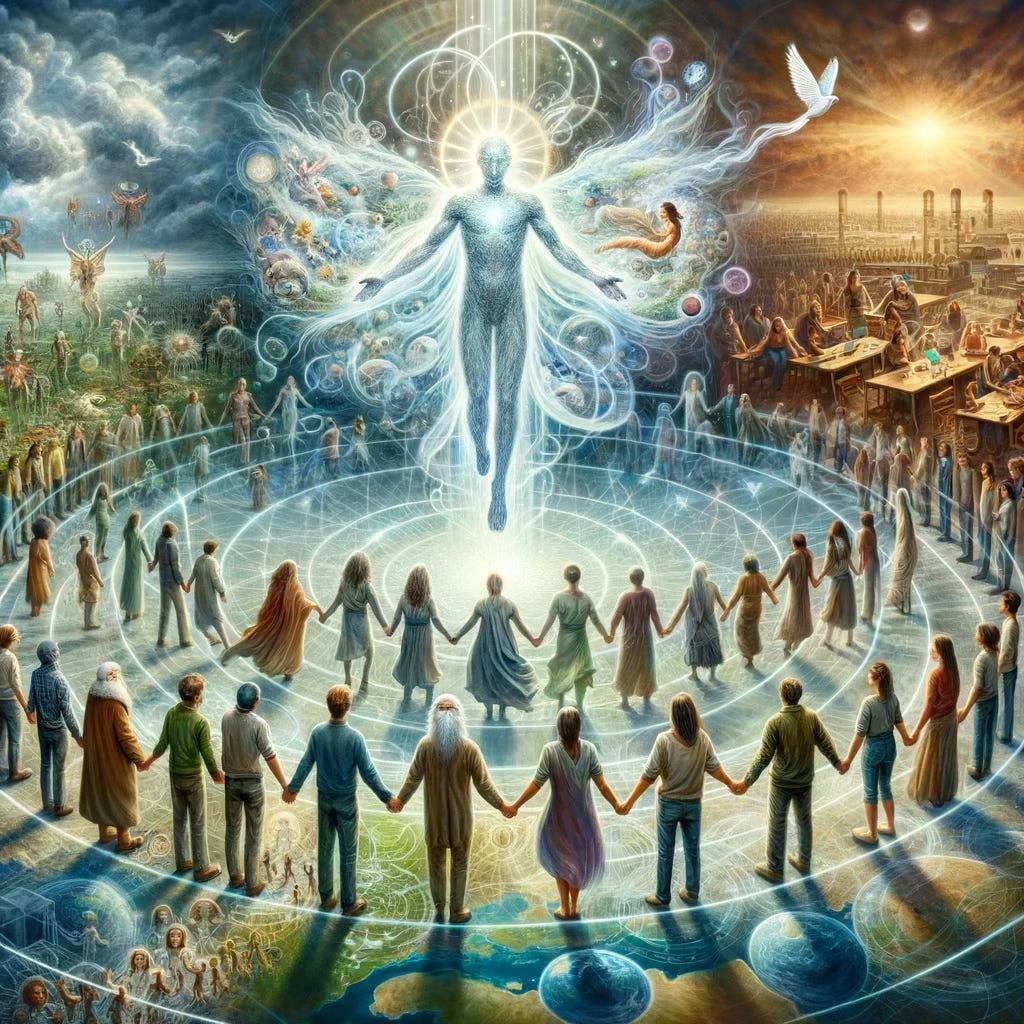Creating God Through Community and Values
Humanity’s Values is a reader-supported publication. Please consider subscribing to support the delivery of the content you appreciate. Also, feel free to share and expand the community of reflective criticism.
Civilizational struggle is often based on the notion that one or another group doesn't share in the other's values and thus warfare or other forms of struggle are about one value overcoming another. This way of looking at civilizational conflict is far more about self-promotion than providing any analytical power. Values do not demand a particular action, they are identifiers for actions already taken. Community is a value, but it would be strange indeed for a person who feels that value from going to a local meet-up to tell the person who feels it at their local church that what they're feeling is not only wrong, but not a proper or accurate manifestation of community. We create our experience of God through community and values.
Values
If values are shared by everyone, but manifest in behavior differently due to the guiding influence of world-views or philosophies, then the simple slogans of warfare become difficult to sustain. No longer can a person say "they don't care about life!" or "they fear our freedoms!" Instead, declarations give way to questions: "how does that person/group define life?" or "what does the person/group believe is the nature of human existence such that certain behaviors are allowable or contemptible?" These questions don't translate well to bumper stickers and they certainly don't help a goal of portraying the opposition as that most evil of entities: "the other."
Faced with the difficulty of delving into world-views, of noting the similarities between self and the enemy, there is a deep desire to find a means of buttressing the simplicity of values warfare. No more powerful means exists than identifying values with one's own deity. Not only do values become identified with an all-powerful force, but they are removed yet further from the affairs of human life. Also, since often the means of knowing said deity is tied to faith, dialogue itself ends as faith is the most basic self-referential form of knowledge.
Connecting values to a deity, or simply ignoring the foundational weight of world-views, is a way of placing the visceral quality of emotivism over rational dialogue. This is true regardless of whether one believes in a deity or doesn't because even the non-believing (which can include atheism or simply a believer in a different deity) group will often start and stop with the god in question. This occurs because "god" is an empty vessel:
The believer has their god become a repository of their needs, desires, and self-narratives. The non-believer can simply fill the deity in question with some form of anti-rationalism or moral failing and move on, all without dealing with the underlying philosophy of the person in question or any identification with the shared values of their mutually-held humanity.
We can see why the focus on deity so easily obscures dialogue by looking at how the god-concept is identified with.
Socio-historical Context
All gods come out of an initial socio-historical context, providing the parameters for their purposing. It's little wonder that the desert nomads of what is considered the modern "Middle East" consider paradise to be some version of a land "flowing with milk and honey." When faced with the endless rolling hills of sand, that would sound like heaven on earth indeed. Indeed, those who attempt defending the odd and fantastical images of apocalyptic visions tacitly accept this point. In every qualification that the prophet in question wouldn't understand modern weaponry or nation-states is an underlying acceptance of religion as deriving wholly from human experience.
"All gods are homemade, and it is we who pull their strings, and so, give them the power to pull ours." -Aldous Huxley
Familial Background and Community
When it comes to each of us personally coming into contact with the gods, we do so through our families and the particular culture we were born into first. Consider that the deep disapproval of apostasy (non-belief or change in belief) is connected to maintaining the homogeneity of home and hearth, rather than any connection to the actual existence of a deity. We enter this world kicking and screaming, find comfort and meaning through the foundational attachment relationships that set our thoughts and emotions in order and are often carried through our first decade or two on this earth via the rituals (birth naming, baptism, manhood rites, feminine mysteries, marriage, death ceremonies) handed down by some form of religious tradition. That is a considerable amount of resources invested in maintaining the continuity of community, thus leaving it would have the greatest of consequences.
"Ancient societies had anthropomorphic gods: a huge pantheon expanding into centuries of dynastic drama; fathers and sons, martyred heroes, star-crossed lovers, the deaths of kings - stories that taught us of the danger of hubris and the primacy of humility." -Tom Hiddleston
Personal Perspective
Lastly we are brought to the individual, the final gate through which god-hood passes. Siblings can grow up in the same family and have quite different memories and understandings of its history and dynamics. Little wonder then that a similar development occurs in one's relationship with the god-concept. It is not terribly surprising people are drawn to particular religious denominations and theological positions that support actions and points of view they already participate in and adhere to. This is where the desire, at the level of society or civilization, to control how a value is "correctly" manifested takes place at the level of the individual. If god be for me, who can be against me?
Where to Go from Here
Promoting the notion of "your god is not my god" is two-fold: one, a person's god-concept is not immediately accessible simply because the term "god" is used or even contingent upon the amount of study given to a particular religion, there are layers to a person's god-concept that can only be understood through dialogue, listening and active empathy; two, a rigid focus on the god-concept can easily blind a person to the existence of an underlying world-view or philosophy. Complex theological systems were not created to deliberately confuse people nor exert control over the masses, they are a testament to the human need to create a foundational structure for meaning and an acknowledgment that simply declaring "I believe in god" means very little without a context.
We are all, every last one of us, in a struggle to provide meaning to an existence that doesn't come with an instruction manual. There is no value that is not shared by everyone else, no matter how dissimilar they may support it because our shared humanity is far broader and far deeper than any single behavior. Every person looks upon the world with a different lens, to varying degrees capable of seeing clearly the interconnected pieces that give it substance. There is no view that holds the market on limitation, we are all limited. In the exploration of those limitations may very well lie the ability to expand the boundaries of our own views. We do create our experience of God through community and values.






